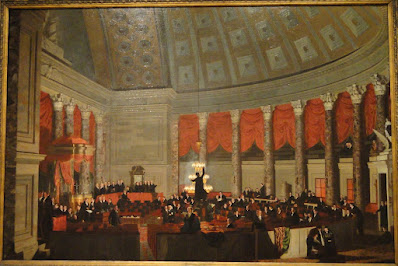[Published as part of Constituting America's Ninety Day Study on America's Founding Principles: Principle of a Legislative Branch Within a System of Government Closest to the People – Constituting America]
In advocating for establishing the Legislative Branch in the U.S. Constitution, James Madison and Alexander Hamilton, writing under “PUBLIUS”, stated in Federalist No. 52:
“First. As it is essential to liberty that the government in general should have a common interest with the people, so it is particularly essential that the branch of it under consideration should have an immediate dependence on, and an intimate sympathy with, the people. Frequent elections are unquestionably the only policy by which this dependence and sympathy can be effectually secured…. It is a received and well-founded maxim, that where no other circumstances affect the case, the greater the power is, the shorter ought to be its duration.”
Madison and Hamilton explained how the Legislative Branch was fundamental to Americans remaining in control of their own government in FEDERALIST No. 57:
“The House of Representatives is so constituted as to support in the members an habitual recollection of their dependence on the people. Before the sentiments impressed on their minds by the mode of their elevation can be effaced by the exercise of power, they will be compelled to anticipate the moment when their power is to cease, when their exercise of it is to be reviewed, and when they must descend to the level from which they were raised; there forever to remain unless a faithful discharge of their trust shall have established their title to a renewal of it.”
Binding the Legislative Branch to the people built upon the precedents from America’s colonial period.
The Royal Charter that established Jamestown in Virginia evolved from governance by the Charter holders into governance by the King’s Representative (Royal Governor) and his Advisory Council. When the settlers demanded their own voice, the Virginia House of Burgesses, in 1619, became the first democratically elected legislative body in America.
The House of Burgesses became a proving ground for what would become the U.S. House of Representatives. Drawing upon British tradition, revenue and spending bills originated in the House instead of the “upper chamber”. Drawing from British tradition, the members of the House held their positions for short periods of time, the better to be held closely accountable by those they represented.
Tying government closely to the people is foundational to America. The reason America is a “federal” system, and not a “national system”, is to preserve state and local government. This assures most public policy and public activity is closest to the people it serves and reflects their diversity. Serving an urban New York City neighborhood is very different from serving a rural community in Montana.
America’s diversity is embodied in our
nation’s motto: “E Pluribus Unum” – out of many, one.
Governing a diverse America is institutionalized in the Tenth Amendment of the U.S. Constitution:
The powers not delegated to the United States by the Constitution, nor prohibited by it to the States, are reserved to the States respectively, or to the people.
Today, America is governed by 87,576 local units. This includes 3,034 counties, 19,429 municipalities (cities, towns, villages), 16,504 townships, 13,506 school districts, and 35,052 special districts (such as water & sewer, fire, and conservation).
Except for Switzerland and Germany, European governments are national. Their policy and programs are based on “one size fits all”. National governments ultimately amplify regional and ethnic tensions. England’s Acts of Union with Scotland (1707) and Ireland (1801) spawned countless conflicts. Today, Scotland and Wales have separate Parliaments. Ireland divided itself into a Free State and Northern Ireland in the wake of years of violence (1921). England leaving the European Union in January 2020 reflected what happens when a weak parliament, which could have embraced diversity, was dominated by a powerful and unaccountable bureaucracy.
America’s federal structure, emphasizing government closest to the people, was chronicled by the Frenchman, Alexis Clerel, the Vicount de Tocqueville.
“Democracy in America” was published in two volumes (1835 and 1840). It remains a foundational document describing how Americans benefit from local government.
“The village or township is the only association which is so perfectly natural that wherever a number of men are collected it seems to constitute itself. The town, or tithing, as the smallest division of a community, must necessarily exist in all nations….”
“….local assemblies of citizens constitute the strength of free nations. Town-meetings are to liberty what primary schools are to science; they bring it within the people’s reach, they teach men how to use and how to enjoy it. A nation may establish a system of free government, but without the spirit of municipal institutions it cannot have the spirit of liberty.
de Tocqueville recognized how Americans preserving local governance serves as a model for a better world:
"I believe that provincial [local] institutions are useful to all nations, but nowhere do they appear to me to be more indispensable than amongst a democratic people.
The only nations which deny the utility of provincial [local] liberties are those which have fewest of them; in other words, those who are unacquainted with the institution are the only persons who pass a censure upon it.”
Thanks to the strength of local government, America remains
an inspiration for all those who seek free and open societies.



